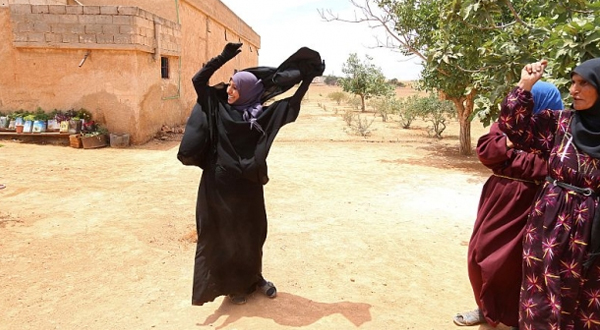JEBB HASSAN AGHA, Syria: A siege by US-backed Kurdish and Arab forces of the key miltants-held city of Manbij in northern Syria left tens of thousands of civilians trapped on Saturday.
Near Damascus, suicide bombings claimed by the Islamic State group outside a Shiite shrine killed at least 20 people, in the latest in repeated deadly strikes on the revered site.
IS has fought back with deadly bombings even as it comes under pressure on several fronts since it declared a cross-border “caliphate” in Syria and Iraq in 2014.
The Syrian Democratic Forces supported by US air strikes encircled Manbij on Friday, severing the militant group’s principal supply route between Turkey and its de facto Syrian capital, Raqa city.
Manbij lies at the heart of the last stretch of territory along Turkey’s border still under IS control, and it was a key point on the militants’ supply line from Turkey.
The Syrian Observatory for Human Rights said warplanes from a US-led coalition have been conducting heavy bombing raids on the town and its surroundings.
“Tens of thousands of civilians still there can’t leave as all the routes out of town are cut,” the Britain-based monitoring group’s head Rami Abdel Rahman told AFP.
He said at least 159 IS fighters and 22 SDF troops had been killed as well as 37 civilians, most of the last group in coalition air raids, since the alliance launched its Manbij offensive on May 31.
“Bakeries in the town haven’t been open since Friday and food is beginning to become rare,” Abdel Rahman said.
– Everything ‘forbidden’ –
Manbij had a pre-war population of about 120,000 — mostly Arabs, but about a quarter are Syrian Kurds. Thousands fled this week as the SDF closed in on the city which has been held by IS since early 2014.
Outside the city in areas reclaimed by the Kurdish-led alliance from IS, residents on Saturday expressed relief.
“We’re so happy and we hope Manbij will soon be liberated as we have relatives there,” said Munzer Saleh, a resident of Jebb Hassan Agha village, 13 kilometres (eight miles) southeast of the city.
“Our village was known for cigarette smuggling so Daesh was always after us,” he told AFP, using an Arabic acronym for IS which prohibits smoking.
Doha Hajj Ali, a young woman, cursed the militants who had laid down strict rules to govern her and her neighbours’ lives.
“They’d say, ‘Cover your eyes’… Make-up, parties, and weddings were not allowed.”
But residents said the village has run out of bread and water, and an AFP reporter saw a young boy beg for bread from passing cars.
“We haven’t eaten bread for two days,” he said, after the SDF seized the village at the start of the week.
Dakish Fatimi, a Kurdish Red Crescent official, said his team had treated dozens of civilians wounded by landmines planted by retreating IS fighters.
– Suicide bombings –
Near the capital on Saturday, bomb attacks outside a Shiite shrine killed at least 20 people including 13 civilians, the Observatory said.
The official SANA news agency said two suicide bombers, one in a car, attacked the entrance to the Sayyida Zeinab shrine, which is revered by Shiites worldwide.
IS claimed the attacks on its Amaq news agency, saying they were carried out by three suicide bombers.
The shrine, around 10 kilometres (six miles) south of the centre of Damascus, is heavily guarded by pro-government forces but has still been the target of several militant attacks.
Syria’s official Al-Ikhbariya channel showed images from the scene of burned-out cars billowing with plumes of black smoke.
A string of IS bombings near the shrine in February left 134 people dead, most of them civilians, according to the Observatory.
And in January, another attack claimed by IS killed 70 people.
Lebanese militant group Hezbollah cited the threat to Sayyida Zeinab as a principal reason for its intervention in Syria’s civil war on the side of President Bashar al-Assad.
The shrine contains the grave of Zeinab, a venerated granddaughter of the Prophet Mohammed, and is renowned for its glistening golden, onion-shaped dome.
The war — which began with the brutal repression of anti-government demonstrations in 2011 — has killed more than 280,000 people and displaced millions.
Peace talks between the regime and opposition have stalled and a ceasfire brokered by Washington and Moscow lies in tatters.





